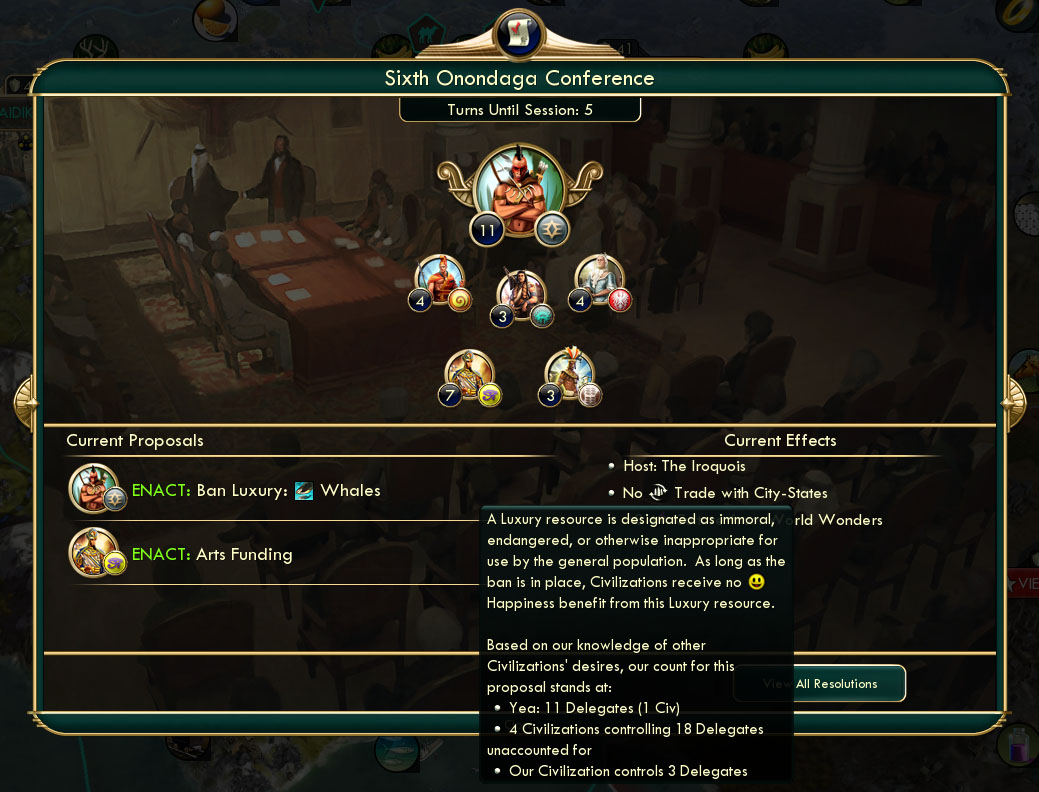

For example, they may gain another Patron different from the civilization you're at war with, or their Patron has been annihilated - Peace will then become immediately possible. An interesting situation, however, may arise due to the fact that Influence with City-States may change even while you're at war with them. If you want peace, you'll need first to make peace with their Patron (and usually peace with City-State allies is included in the peace treaty already). There's only one catch when City-States are concerned: if you're at war with their Patron (ally), any peace negotiations with the City-State becomes impossible.

You, on the other hand, may attempt to bribe them with Gifts, bully them, or you may decide to Declare War on them. They will often approach you with "missions," if your Influence with them is at least Neutral. Since each City-State is basically neutral, diplomatic relations are pretty straightforward, and depend entirely on your amount of Influence with the particular City-State.

So much so that, as an act of goodwill, they offer a small Gold gift to each major civilization when it first discovers them! City-States try to stay out of the big struggles of the great, but at the same time they often ask the great for help in different matters and also the great can use them to achieve their own goals, so they constantly try to befriend City-States. Embassies later have to be reopened with another specific diplomatic action (in the case of denouncing, this can be done immediately on the next turn in the case of war you have to negotiate peace first).Ĭity-States are the "minor" players in the game, and they know it. Note that Embassies are closed mutually when one civilization denounces another civilization, or when they enter a war with each other. Also, you gain a small boost in relations with the other civilization. Or, either of you may offer the other a small gift of Gold in exchange for the right to establish an Embassy.Īfter you open an Embassy, the location of the other civilization's Capital is revealed on the map (though gain permanent vision of it only if you send a Spy or a Diplomat there). Also, in Gods & Kings, most treaties (except a Declaration of Friendship) may only be signed after you establish Embassies in each other's Capitals. This becomes possible after discovering Writing, and is usually quite easy. You need the other civilization to consent (also, if they ask you, you need to consent), and it's usual for the two countries to simply exchange Embassies. However, certain high-level actions (such as signing treaties) will only become possible after certain Technologies have been researched. Negotiations with civilizations are possible from the start. You can talk to leaders even if you're at war with them, but only to try to negotiate peace.

You can initiate contact with each of them at will, simply by clicking on the particular entity.ĭiplomatic contacts may be initiated by you, or by the AI (during their turn). Click on the Diplomacy button in the upper right corner of the screen - all civilizations and City-States you know already will appear in the list here. You can accomplish a lot through diplomacy: you can trade to make profit off your civilization's excess production you can gain allies and isolate your enemies you can create defensive and offensive pacts you can advance your technology through cooperative research ventures you can end wars that are going badly for you you can bluff the credulous and bully the timid.Īnd finally, if you make enough allies, you can achieve a diplomatic victory!ĭiplomacy may be conducted throughout the game with all entities you've already discovered in the world. Some are honest and others are liars some are warlike and others prefer peace. The world is huge and filled with other civilizations whose leaders are at least as cunning and determined as you are. 5.1.1 Trading Delegates in the World Congressĭiplomacy is the art of making relations with other game entities in Civilization V.4 Diplomatic Relations with Other Civilizations.


 0 kommentar(er)
0 kommentar(er)
